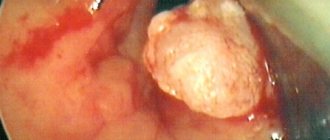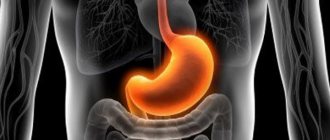Lump in throat with gastritis
Very often people experience a feeling of a lump in their throat.
This phenomenon can occur for all sorts of reasons that, at first glance, seem to be unrelated. Very often people experience the feeling of a lump in their throat. This phenomenon can occur for all sorts of reasons that, at first glance, seem to be unrelated. One of these cases is the appearance of a lump in the throat due to gastritis and other diseases of the gastrointestinal tract. Gastroenterologists say that such a symptom can often disturb a patient with gastritis. After all, when gastric juice enters the esophagus, it irritates the organs of the pharynx.
It is for this reason that patients with gastritis are often tormented by the feeling of a lump in the throat, heartburn, belching, an unpleasant taste in the mouth and a sore throat. Doctors urge you to contact a medical facility if you frequently observe such signs. Such minor manifestations may be the first signs not only of gastritis, but also of other more serious diseases, for example, gastric ulcers and gastric cancer.
The difference between the symptoms of GERD and other diseases
And yet, if you observe the signs of the disease, you can identify some differences:
- a lump in the throat, burning sensation, belching and stomach pain are most often characteristic of diseases of the digestive system;
- respiratory problems are generally not manifested by the presence of reflux, nausea, heartburn and stomach pain after eating food;
- if the nature of the manifestation of the feeling of a lump in the throat is associated with neurological pathologies, then an exacerbation occurs after emotional experiences, and not after the person has eaten;
- If the patient follows a therapeutic diet for a week or two and the pain goes away, then these are problems of the digestive organs, and they need to be examined first.
Return to contents
Causes of a lump in the throat
Let us first consider the reasons that are not related to the presence of certain diseases of the body:
Severe anxiety before an exam, an important interview, or fear of visiting the dentist can cause symptoms such as hand tremors, indigestion, difficulty breathing, and increased sweating. A person under stress usually also complains of difficulty breathing, dryness and a lump in the throat. Such a condition is not a deviation and goes away within a few minutes (hours) after the main cause of its occurrence has been eliminated (an exam has been passed, an interview has been completed, etc.).
There is a separate category of people who regularly experience so-called panic attacks. The causes of this condition are varied. It is not considered as a separate disease and more often becomes a manifestation of vegetative-vascular dystonia. Symptoms of another approaching panic attack include a lump in the throat, difficulty breathing, increased heart rate, darkening of the eyes, and increasing anxiety. This condition, as a rule, does not threaten human health, but its frequent occurrence can significantly reduce the quality of life.
A lump in the throat is a characteristic symptom of many diseases of the upper respiratory tract, occurring in acute or chronic form. These diseases include: tonsillitis. pharyngitis. bronchitis. If you have an upper respiratory tract infection, symptoms such as pain and sore throat are sure to be noted. cough, nasal congestion, increased body temperature. deterioration in overall health. Allergies and adenoids can also cause an unpleasant feeling of a lump in the throat.
The rarest cause of this symptom is a rapidly progressing tumor of the nasopharynx, compressing adjacent tissues and thereby causing lack of air, difficulty swallowing, increased salivation, etc.
Also, a frequently occurring feeling of a lump in the throat can be caused by diseases of various body systems:
- hyperthyroidism, thyroid adenoma;
- hernia of the upper spine;
- esophagitis, gastritis. When diagnosing the cause, it is important to pay attention to accompanying symptoms and manifestations.
You may be interested in: Pancreatin for gastritis.
Causes
The main reason for the development of an unpleasant sensation of a lump in the throat is considered to be a gastrointestinal problem - gastritis. The following factors can provoke permanent symptoms:
- Psycho-emotional instability. Against the background of constant stress, a “hysterical lump” develops in the form of a throat spasm. The symptom is not associated with pathologies of internal organs and is manifested by lack of air, shortness of breath and suffocation. When the psycho-emotional state stabilizes, it goes away on its own.
- Gastrointestinal diseases - gastritis, cholecystitis, pancreatitis, improper metabolism. Usually a lump in the esophagus is accompanied by pain, a sour aftertaste, heartburn, and belching.
- Autoimmune pathologies, inflammation of the thyroid gland that developed against the background of iodine deficiency in the body.
- Prolonged inflammation of the throat, which has passed into the chronic stage, usually of viral etiology - streptococcal pharyngitis, sore throat. It appears as a painful lump in the throat.
- Disorders in the spine - neck protrusions, hernias, osteochondrosis. Along with the coma, a chronic lack of oxygen and discomfort develops throughout the entire larynx.
- Vegetative-vascular dystonia associated with disruption of the autonomic nervous system. Against the background of the disorder, other pathologies develop that affect the entire body. Symptoms: hyperventilation, dryness of the oral mucosa, lack of air, numbness of the tongue, shortness of breath, suffocation, a lump in the esophagus.
- Oncology. The growth of the tumor causes hoarseness, pain of various types, dry cough, excessive salivation and mucus, and a lump in the throat.
A severe and frequent cough may occur periodically.
The periodic occurrence of the symptom develops in the following conditions:
- neck injury;
- severe and frequent cough;
- side effect when taking medication;
- cold;
- obesity;
- hernia in the esophagus, diaphragmatic opening;
- impaired digestive function due to poor nutrition.
Return to contents
What is the connection between stomach pain and sore throat?
Sore throat also occurs for various reasons. Most often, its culprits are a common respiratory viral infection or bacterial and viral inflammation of the ENT organs. But if a sore throat occurs along with an aching, dull pain in the stomach, heartburn, a feeling that there is a lump in the esophagus or larynx and, moreover, there are no signs characteristic of colds - fever, runny nose, headache, then pathology can be suspected which is called gastroesophageal reflux. Reflux - (from Latin refluo - to flow back or back).
Gastric reflux means that the contents of the stomach (undigested pieces of food along with stomach acid) flow back up the esophagus and can reach the throat. The acid in the gastric juice irritates the mucous membrane, causing pain in the throat and a feeling as if there is a lump in the throat. Sometimes such pain radiates to the ear, the disease is accompanied by heartburn, belching, hiccups, and aching pain in the stomach.
Often, taking medications - antacids - eliminates sore throat in this disease, since antacids neutralize the acid and relieve its irritating effect. Separate mention should be made of cough. This symptom can be misleading, since cough usually accompanies pathologies in the throat, upper and lower respiratory tract. But a cough can also be one of the signs of reflux disease.
How to distinguish such a cough? With reflux, a cough appears a short time after eating, is accompanied by a burning sensation in the throat and upper esophagus, is non-productive (dry, without mucus production), and quickly disappears after taking an antacid and eliminating heartburn. But such a cough, especially if it also hurts the throat, is mistaken for a symptom of laryngitis, tracheitis, or tonsillitis and they put off going to the doctor, who could establish the true cause of the ailment and prescribe the correct treatment.
Other reasons
There are other causes of the symptoms described when they are not caused by diseases:
- Stress and mental instability. It is this condition in a person that can provoke similar symptoms. A lump in the throat often appears in people who are experiencing something; it appears as a result of a nervous disorder and is called in medicine a “hysterical lump.” This problem goes away on its own after some time. During a mental disorder, people experience severe tension in the muscles at the bottom of their throat, which leads to an uncomfortable feeling. In addition, stress and depression may be accompanied by other symptoms, such as chest pain, difficulty breathing and increased sweating. Often a person’s tongue becomes numb and their mouth becomes dry. For relief, you need to massage and relax.
- Cough. Problems arise with colds and other abnormalities that are accompanied by a cough. In this state, a person tries to clear his throat and a lump appears in the throat and heaviness in the stomach.
- Obesity and overeating. Stomach problems and a feeling of a lump in the throat can occur if you are obese or eat a lot of food, especially before bed.
- Medications. In some cases, symptoms appear after long-term use of medications or as a side effect of certain tablets and powders sold in pharmacies.
If unpleasant symptoms appear, it is not recommended to ignore it or make a diagnosis and treatment yourself. This will not lead to anything positive.
The very first thing that is recommended to do is to consult a doctor, namely a gastroenterologist; in some cases, the help of an otolaryngologist or endocrinologist may be required.
After diagnosis, the doctor can determine the causes and tell you what to do and take.
Feeling of a lump in the throat - what is it?
In itself, the phenomenon of a lump in the throat does not pose a danger to human health.
Usually it goes away safely within a few minutes after its occurrence, and then appears again (under severe stress or anxiety). In itself, the phenomenon of a lump in the throat does not pose a danger to human health. Usually it goes away safely within a few minutes after its occurrence, and then appears again (with severe stress or anxiety). If the cause of this symptom lies in vegetative-vascular dystonia or chronic depression, it can occur at any time of the day, regardless of surrounding circumstances. In such a case, it is recommended to contact a specialist - a neurologist or psychiatrist, who will prescribe effective treatment.
Many patients facing psychological problems benefit from visiting a psychologist. This specialist will first try to identify the cause of the pathology, in this case - prolonged depression, stress or panic attacks, and will help get rid of it in order to avoid unpleasant manifestations from the body in the future.
The feeling of a foreign object in the throat and difficulty swallowing are characteristic of various diseases of the thyroid gland. First of all, for diffuse toxic goiter (Graves disease), the occurrence of which is associated with a lack of iodine in the human body. Usually the disease is asymptomatic; in the later stages of its development, the patient experiences cardiac dysfunction, weight loss, and frequent digestive disorders.
A characteristic manifestation of Graves' disease is protrusion of the eyeballs or exophthalmos. If left untreated, the disease progresses rapidly, increasing the likelihood of developing a thyrotoxic crisis. It is not possible to determine the presence of pathology by the presence of one or two symptoms. Diagnosis of diffuse goiter is based not only on a patient interview, but also on blood test data and ultrasound of the thyroid gland.
Some diseases are practically asymptomatic. Their presence is precisely indicated by such a minor change on the part of the body as a lump in the throat. In this case we are talking about laryngeal tumors. These tumors can be benign: polyps, granulomas, cysts, fibroids, and malignant or cancerous. In such cases, the sensation of a foreign body or lump in the throat is associated with the tumor reaching a certain size, when it becomes noticeable and puts pressure on neighboring tissues. At a later stage in the development of the disease, the patient experiences other symptoms: enlargement of the submandibular and cervical lymph nodes. hoarseness, sore throat, cough, difficulty breathing, impaired swallowing function.
If you experience a frequent feeling of a lump in your throat, you should consult a specialist, even in the absence of any other symptoms, since this manifestation of the body may indicate the presence of life-threatening pathologies, the treatment of which must begin as early as possible.
Diagnosis
The main diagnostic method is fibrogastroscopy.
The main diagnostic method is fibrogastroscopy. This method allows, using a probe that is inserted into the esophagus through the mouth and then into the stomach, to evaluate the gastrointestinal mucosa. The examination is carried out using a special camera that is built into the probe. Fibrogastroscopy also makes it possible to determine the degree of inflammation of the mucous membrane during gastritis, type, and location. At the same time, doctors use a probe to collect tissue for biopsy, and also test for the presence of the malignant bacterium Helicobacter pylori.
The study is carried out on an empty stomach; in addition, preparation for the procedure is required, the exclusion of food for a certain time. During the diagnosis, vomiting may occur. When a probe is inserted, it does not block the airway, but difficulties may arise, which should be tolerated. The study does not take much time; throughout the entire diagnosis, the patient needs to follow all the doctor’s instructions.
In addition to fibrogastroscopy, other methods are used:
- The acidity of gastric juice is assessed.
- A blood test is done.
- Antibodies are detected in the mucous membrane.
- The boundary between pepsin and gastrin is established.
- They do a stool test.
After carrying out a number of activities and obtaining the necessary data, the doctor determines the treatment method for gastritis with a lump in the esophagus.
How to diagnose?
To accurately determine the cause of the appearance of a coma in the esophagus, a person should visit an endocrinologist, otolaryngologist, gastroenterologist, neurologist, or surgeon. If necessary, doctors will prescribe a specific list of tests and studies, based on the results of which treatment will be prescribed. A complete examination of the body consists of the following procedures:
- taking general tests (blood, stool and urine samples) - to assess the condition of the body;
- blood biochemistry - to assess the functionality of organs;
- examination of the cervical vertebral area, lymph nodes, thyroid gland;
- Ultrasound of the abdominal cavity;
- endoscopy is a visual examination of the condition of the gastrointestinal mucosa.
Gastritis and lump in throat
If your throat hurts after eating, in this case we can talk about the development of gastritis and other problems with the digestive system in the body. The feeling of a coma during gastritis is associated with the release of stomach contents into the esophagus. Since the contents most often have an acidic environment, it irritates the surface of the esophagus and pharynx and causes associated sensations. If the problem is clearly related to gastritis, then in addition to a lump in your throat you will feel:
- Sourish and unpleasant taste in the mouth;
- Constant belching after eating;
- Chest burning and heartburn.
Unpleasant sensations develop after eating, often accompanied by a feeling of pain or heaviness in the stomach.
You can find out what exactly is causing the lump in the throat with gastritis through medical research. A medical specialist examines the patient, records complaints and visible symptoms and refers the patient for examination. First of all, if gastritis is suspected, it is necessary to take blood and stool tests, which will confirm inflammatory processes in the body.
An examination of the spinal and cervical region is required to identify possible problems with the vertebrae, thyroid gland and lymph nodes.
The patient is sent for an ultrasound examination of the abdominal organs. Endoscopy is considered the most effective examination technique. In modern clinics, the patient swallows a small camera, with which the gastrointestinal tract is examined. Based on the results obtained, treatment is prescribed.
Diagnostics
To establish an objective diagnosis, it is advisable to visit an endocrinologist, otolaryngologist, gastroenterologist, neurologist, or surgeon. Only a doctor can prescribe adequate treatment based on the results of the necessary studies.
If a lump in the throat appears after eating, accompanied by heartburn, heaviness in the stomach, pain and discomfort, gastritis is most likely the cause.
During the digestion process, excess gastric juice enters the esophagus under the influence of air, which irritates the larynx. To confirm the diagnosis, it is necessary to undergo a complete examination of the body, which includes the following measures:
- general blood test, urine test;
- blood chemistry;
- diagnostics of the condition of the cervical spine, lymph nodes, thyroid gland;
- ultrasound examination of the abdominal organs;
- diagnosis of the gastric mucosa using a probe.
How to get rid of a lump in your throat
Treatment is prescribed taking into account the cause of the symptom. There are several ways to get rid of an unpleasant feeling in the throat. For example, if its occurrence is associated with any disease of the upper respiratory tract, it is recommended to gargle regularly throughout the day with an antiseptic solution (chamomile decoction, water with sea salt and iodine are also suitable). Eliminating the symptoms of tonsillitis is facilitated by sucking special tablets (Strepsils) and irrigating the throat with a spray (Stopangin). These medications actively fight bacteria that cause inflammation and help eliminate pain, soreness, eliminate the feeling of a foreign body in the throat, and prevent coughing.
You can ease the unpleasant manifestations of fear, anxiety or an impending panic attack with the help of regular drinking water. In this case, you should drink the liquid in small sips. People who experience frequent panic attacks are advised to always keep a small bottle of water in their bag.
In many cases, eliminating the symptom of a lump in the throat alone is not enough; treatment of a specific disease is necessary, first of all this concerns various tumors of the throat and hyperthyroidism.
Reason 5: Emotional stress
Like all muscles, the muscles of the pharynx are controlled by the nervous system. In an excited state, the tone of the nerve fibers increases, causing the muscles to contract. It becomes difficult for a person to speak, swallow, and there is a feeling of a lump in the throat. An unpleasant symptom can be a consequence of stress, overwork, or chronic lack of sleep.
How is it treated?
Frequent walks in the fresh air, active sports, and consultation with a psychotherapist are recommended. To alleviate the condition, sedatives, antidepressants, and acupuncture may be prescribed.
The “Live Healthy!” program also talks about a coma in the throat:
There are many symptoms that indicate a wide range of different diseases. The feeling of a “lump in the throat” is a similar sign. To apply treatment, it is necessary to understand what causes the discomfort.
What is a lump in the throat? Tension, spasm, feeling of a squeezing metal ring, pressing, tickling, making it difficult to swallow. Sometimes a sore throat, pain or choking develops. This is how we can describe the upcoming state. But in parallel, other symptoms indicating the cause of the syndrome are monitored.
Let's look at what diseases a lump in the throat indicates.
- When infectious diseases of the upper respiratory tract (for example, sore throat or pharyngitis) are excluded, the cause may lie in psycho-emotional states. Under the influence of stress, the muscles of the larynx spasm, and a feeling of constriction appears. Soon the disturbance passes, but if the situations are often repeated and the sensations too, neurosis develops and the help of a psychotherapist will be required.
- A lump, sore throat, dryness, discomfort and cough are signs of a serious illness, for example, throat cancer. An additional symptom that distinguishes the pathology from others is hoarseness and loss of voice. It is especially important to monitor symptoms in the early stages, when the tumor has not grown much.
- A sedentary lifestyle leads to degenerative processes in the intervertebral discs and the occurrence of osteochondrosis. When the spine is deformed, the nerve endings are compressed, a spasm of the neck muscles occurs, and a feeling of a lump in the throat is born. Injuries to the neck and back of the head, hernias will also cause the feeling.
- Cardiovascular diseases, heart attack, stroke are characterized by pain in the heart area, manifested by discomfort in the neck, in particular pain and a lump in the throat.
- Thyroid dysfunction is characterized by a sensation of a foreign body in the larynx. Especially if the disease occurs in tandem with disorders in the functioning of other organs and is considered autoimmune.
- Gastritis and other gastrointestinal diseases. The throat is the entrance gate of the digestive tract; any disorders in the digestive system result in unpleasant discomfort - a lump, soreness or burning sensation is felt in the mouth and throat.
Treatment
If a lump in the throat is caused by gastritis, drug therapy is prescribed aimed at eliminating the main problem. The success of treatment will depend not only on how correctly the doctor selected the drugs, but also on the patient’s desire to get rid of the problem. In addition to taking medications, it is necessary to adhere to a diet, follow a diet and give up bad habits that interfere with the proper functioning of the stomach. Numerous folk remedies that can be combined with diet and medications have a positive effect on the body.
Folk remedies
You can eliminate unpleasant sensations in the throat using old-fashioned techniques:
A lump in the throat with gastritis is a fairly common symptom in diseases of the gastrointestinal tract.
A full, healthy sleep not only alleviates the patient’s condition, but also makes other treatment methods more effective. It is advisable to sleep on a hard surface with your head slightly elevated;- It is advisable to include foods rich in iodine in your daily diet;
- Make it a habit to go for evening walks;
- Skip regular black and green tea in favor of herbal teas. Herbal tea made from lemon balm, valerian or motherwort will have a calming and relaxing effect and help relieve discomfort in the throat.
A lump in the throat with gastritis is a fairly common symptom in diseases of the gastrointestinal tract. If a problem arises, it is advisable to seek advice from your doctor to rule out the presence of third-party diseases. Treatment of a lump in the throat is mainly aimed at combating gastritis. Remember, only an integrated approach to treating the problem will help you forget about it forever.
Frequent lumps in the throat and prolonged malaise should be alarming, but there is no need to treat yourself. It is important to accurately establish the diagnosis and causes of the symptom. The condition in the esophagus is very unpleasant and may indicate various disorders.
Painful sensations in the stomach occur quite often and the patient, by the nature and location of the pain, can most often easily determine the cause of its occurrence - overeating, eating food that is heavy for him or an exacerbation of chronic diseases of the stomach, liver, pancreas. But it happens that the pain in the stomach radiates to the throat, there is a burning sensation in the esophagus, a coma in the larynx. Why does this happen? Which symptom - pain in the stomach or throat - indicates a disease, and which is a side effect? This article will answer these questions.
Main directions of treatment
If during the diagnosis it is determined that the cause of the lump in the throat is gastritis and concomitant gastrointestinal diseases, treatment is carried out in two directions.
Drug therapy
The choice of medications for the treatment of gastritis depends on the acidity of the stomach and the type of pathology. For reflux esophagitis, peptic ulcer, hyperacid gastritis, acid-reducing agents are indicated:
- Proton pump inhibitors (Omez) - these drugs block the secretion of hydrochloric acid by the parietal (glandular) cells of the stomach. PPIs reduce irritation of the esophagus from excess gastric juice, relieve symptoms of belching and heartburn;
- H2 receptor blockers (Famotidine) - drugs in this group inhibit the synthesis of histamine, which stimulates the production of gastric juice. They are prescribed if the patient for some reason cannot take PPIs;
- Antacids are substances that neutralize excess hydrochloric acid. Absorbing antacids (soda, Rennie), while temporarily relieving the symptoms of heartburn, provoke increased secretion of gastric juice. With chronic gastritis, they do more harm than good. Non-absorbable antacids (Almagel, Phosphalugel, Maalox) quickly relieve heartburn and maintain a normal level of acidity in the stomach, each of them has its own side effects and contraindications;
- the fight against Helicobacter pylori - eradication therapy - includes complex administration of drugs of various spectrums of action: antibiotics (Amoxicillin, Amoxiclav), products containing bismuth (De-Nol), proton pump inhibitors.
For low acidity, vitamin B12 injections, enzymes and gastric juice substitutes, and hormonal medications are indicated.
To relieve laryngeal spasm and pain in the throat, antispasmodics (Papaverine) are prescribed.
Each of the drugs has its own specifics, side effects and contraindications, so the selection of medications should be carried out individually under the supervision of a gastroenterologist.
Diet and prevention
Drug therapy alone without following a diet cannot alleviate the patient’s condition and provide stable remission. Food harmful to the stomach and improper diet will sooner or later provoke an exacerbation of symptoms and complication of the disease. For hyperacid gastritis, it is extremely undesirable to abuse:
- fried and fatty foods;
- pickles, marinades, spices;
- baked goods;
- chocolate;
- strong coffee.
With atrophic gastritis, on the contrary, the use of foods that increase the secretion of gastric juice is indicated.
Exercises that strengthen the abdominal muscles help remove the feeling of a lump in the throat: breathing with the stomach, holding your breath, alternating deep and shallow breaths. A good prevention of gastritis is an active lifestyle, anti-stress therapy, and sleep patterns.
We recommend: Is it possible to drink rosehip decoction, infusion and tea if you have gastritis?
Breathing exercises for feeling a lump in the throat
The following training is considered an effective complex: Alternate short and fast breaths with slow and strong exhalations.
Proper breathing with a coma in the throat allows you to get rid of the symptom. For maximum effectiveness, they must be performed every day, preferably in the morning. The following training is considered an effective complex: Alternate short and fast breaths with slow and strong exhalations. After this, you need to take a paper bag and breathe into it, holding the air in for 5 seconds. Inhale through your nose, activating your stomach, hold the air for 3-5 seconds, then exhale slowly through your mouth. After completing the workout, you can stretch your entire body with light exercise or gymnastics. It is also beneficial for gastritis as it improves gastric motility. You can warm up your neck with even and smooth breathing throughout the day.
You may be interested in: Eating chickpeas for gastritis.
Preventive measures
To avoid discomfort, it is necessary to use simple preventive measures. To do this, it is recommended to follow these rules:
- Try to play sports and lead a healthy lifestyle.
- Eat properly and balanced, do not overeat, especially before bed. The last meal should be a couple of hours before bedtime. You should avoid harmful foods that take a long time to digest and irritate the gastric mucosa.
- Adjust your daily routine, go to bed on time and try to get about 8 hours of sleep. It is better to eat smaller meals and at the same time.
- Do not speak while eating and chew food thoroughly.
- Use only fresh ingredients for the menu, with a minimum amount of chemicals.
- It is not recommended to overuse baked goods, sweets, spices, as well as fatty, fried and salty foods. Quit smoking and drinking alcohol.
- Maintain proper drinking regime.
- For an adult, the normal fluid intake per day is about 2 liters. You can drink not only water, but also teas and compotes. Consume more plant foods, they are rich in nutrients and can normalize the functioning of the gastrointestinal tract. It is recommended to add natural yoghurts, without additives, and kefir to the menu.
- You should avoid stressful situations and worry less. Using similar rules, you can get rid of and eliminate the appearance of a lump in the throat, heaviness and pain in the stomach.
- In addition, this will improve the general condition of the body, as well as eliminate various diseases that are not related to the gastrointestinal tract. If symptoms appear, you can try to use folk remedies to stop the discomfort, but it is better to discuss them with a doctor so as not to harm yourself.
Sources:
https://gastrit.guru/lechenie/kom-v-gorle-pri-gastrite.html
https://gastritinform.ru/zheludokzdorov.ru/simptomy-gastrita/kom-v-gorle-simptom-gastrita.html










